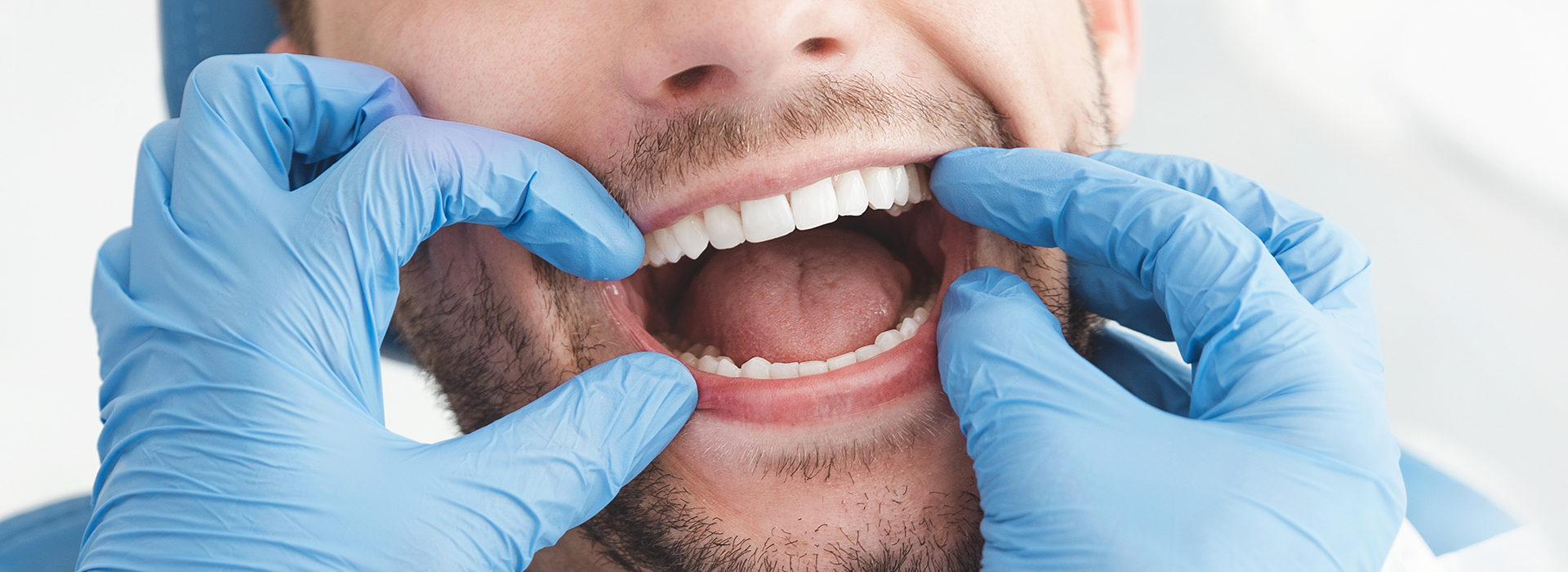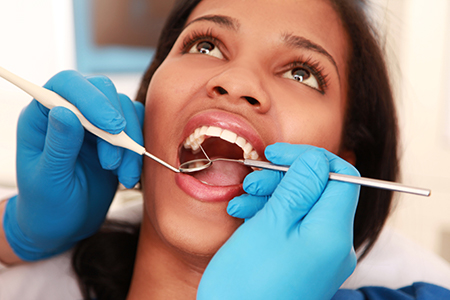
At the office of Saugeen Shores Family Dentistry, we take a preventive approach to care because early detection and consistent attention are the best ways to preserve healthy, confident smiles. Regular oral exams are more than a quick check of the teeth — they are an opportunity to assess the whole oral environment, spot early warning signs, and customize care to each patient's needs. Our team combines clinical experience with patient education so you leave each visit with a clear understanding of your oral health and practical steps to protect it.
The initial appointment is about building a complete picture of your oral health. We begin by reviewing your medical and dental history and listening to any concerns you bring. This conversation helps us identify risk factors — such as medications, medical conditions, or lifestyle habits — that could influence your dental care and guide how we proceed with the clinical exam.
During the exam we inspect teeth, gums, and supporting tissues, evaluate your bite and jaw function, and check for signs of wear from clenching or grinding. When appropriate, we will recommend diagnostic images to reveal issues hidden beneath the surface. We also perform a thorough oral cancer screening and a periodontal assessment to look for early signs of soft tissue or gum disease.
After gathering findings from the exam and any imaging, we discuss a clear, patient-centered plan. That plan prioritizes prevention and explains any treatment options in plain language so you can make informed decisions. Our goal is to set achievable steps that maintain health and prevent problems before they progress.

Oral health is tightly connected to overall health. Conditions that affect the teeth, gums, jaw, and surrounding tissues can influence — and be influenced by — systemic health. During an oral exam we not only look for cavities and gum disease, but also for signs that may point to broader medical concerns. Identifying these signs early can prompt timely discussions with your medical team when appropriate.
Research increasingly links oral disease with a range of systemic conditions. Chronic inflammation in the mouth is associated with respiratory concerns, cardiovascular disease, and complications in people with diabetes. In addition, there is growing evidence that oral health may play a role in digestive health and could be relevant to cognitive conditions over time.
We also recognize the reverse relationship: systemic illnesses and certain medications can cause oral symptoms such as dry mouth, oral lesions, or changes in gum tissue. When our clinicians spot these indicators during an exam, we document findings carefully and communicate recommendations for follow-up care to help protect your overall well-being.

Professional cleanings and routine exams are the foundation of long-term oral health. Daily home care is essential, but even the best brushing and flossing can miss tight spaces where plaque hardens into tartar. During a hygiene visit, our dental hygienists remove buildup, polish the teeth, and address areas prone to gum inflammation — all measures that reduce the risk of cavities and periodontal disease.
Checkups also let us monitor changes over time. Small issues that are easy to treat when found early can become more complex if ignored. Regular visits allow us to detect decay, assess gum health, and note changes in tooth position or bite, so we can recommend conservative, effective solutions when they are most successful.
Education is a central part of every hygiene appointment. Our team provides tailored guidance on brushing and flossing techniques, the best products for your needs, and dietary tips to support oral health. For children, routine visits help establish positive habits and allow us to watch jaw and tooth development so any need for orthodontic care is identified at the right time.
We encourage patients to view preventive care as an investment in comfort and function: staying current with exams and cleanings helps you avoid more invasive procedures later and supports a lifetime of healthy smiles.
A careful visual exam reveals a great deal, but diagnostic imaging is essential to fully evaluate tooth roots, bone levels, and areas between teeth. Digital x-rays and other radiographs allow us to detect decay beneath restorations, assess bone support around teeth, and plan treatment with a higher degree of precision than observation alone.
Digital radiography has transformed how we capture and review images. These systems require less radiation than traditional film, produce images instantly, and let us enhance and magnify areas of interest on-screen for more accurate interpretation. Digital files are also stored in your electronic record for convenient comparison over time.
Beyond standard two-dimensional x-rays, advanced three-dimensional imaging such as cone-beam computed tomography (CBCT) can be used when complex diagnosis or surgical planning is needed. Whether for evaluating impacted teeth, mapping anatomy before implant placement, or assessing structural concerns, modern imaging tools help us tailor care to each patient's anatomy and clinical goals.

Different types of radiographs serve distinct diagnostic purposes. A periapical film focuses on a single tooth from crown to root and is useful when assessing root health or diagnosing infections. Bitewing images capture the crowns of back teeth and are especially helpful for finding early decay between teeth. A full mouth series combines these views to establish a comprehensive baseline of dental health.
Panoramic films provide a broad, two-dimensional overview of the jaws, teeth, and adjacent structures; they are useful for evaluating erupting teeth, impacted third molars, and the general condition of the jawbone. Cephalometric films — often used in orthodontic assessment — offer a profile view that helps evaluate facial growth and jaw relationships when planning corrective treatment.
For select cases, three-dimensional CBCT imaging offers detailed visualization of bone, teeth, and surrounding anatomy. This level of detail can be invaluable when planning precise procedures such as implant placement or complex oral surgery. Our clinicians weigh the diagnostic benefits against patient exposure and recommend the least invasive option that still provides the information needed for safe, effective care.
In summary, comprehensive oral exams combine careful clinical assessment, targeted imaging, and personalized education to protect your smile and support overall health. With a focus on prevention and clear communication, our team helps patients understand their options and make well-informed choices. For more information about oral exams or to discuss your individual needs, please contact us for details and to arrange an appointment.
Yes. We always welcome new patients and their families for care. Feel free to give us a call or reach out to us online to schedule a first visit or for any additional information on our office. We look forward to hearing from you!
Routine dental checkups and professional cleanings help ensure your smile remains in tip-top condition and that any developing problems receive the prompt care they require. While it's a good idea to schedule a checkup and cleaning twice a year, longer or shorter intervals between routine visits depend on your specific needs.
We understand that life gets complicated and busy, and for various reasons, you haven't been able to get to the dentist for care. Don't worry; it's always a good time to get back in touch with the health of your smile.
At Saugeen Shores Family Dentistry, we offer skilled and compassionate care to address a wide range of dental needs. Whether you need a simple checkup and cleaning, restorations, periodontal treatment, root canal therapy, or the replacement of missing teeth to get your smile back into shape, we provide precise, gentle, stress-free treatment to give you a smile that is as beautiful as it is healthy.
Give us a call today; we're happy to address all your questions and concerns about getting your smile back in tip-top condition.
For pregnant women, practicing good oral care and seeing the dentist to maintain a healthy smile is considered an important component of prenatal care. Researchers have found that pregnancy not only increases the risk of oral health problems, but these problems may also lead to pregnancy complications. At the office of Saugeen Shores Family Dentistry, we provide the skilled and compassionate care required to help expectant mothers keep their teeth and gums in tip-top condition. While certain procedures are not recommended during pregnancy, we provide the necessary care and take all the necessary precautions required.
Thanks to advances in modern dentistry, teeth that have been affected by a range of imperfections or that have sustained damage from trauma or dental decay can be restored to produce a naturally beautiful looking and functional smile.
As skilled and experienced providers of care, our office can effectively improve and enhance the appearance of teeth that are stained, discolored, misshapen, chipped, fractured, gapped, crowded, or broken down due to dental decay. At the office of Saugeen Shores Family Dentistry, we offer a comprehensive selection of the leading-edge cosmetic solutions from teeth whitening procedures, dental bonding, tooth-colored fillings, and veneers, to prosthetic solutions and dental implants to rebuild complete and beautiful smiles.
Contact our office to learn more about the many ways we can help you create the smile you've always wanted.
If you're visiting Saugeen Shores Family Dentistry for the first time, it is helpful that you contact your former dental office and have your records sent over to us. Make note of any problems you may have so that you can discuss them with your dentist.
To provide efficient service, we ask you to please bring your insurance card, an ID, plus any referral slips or diagnostic records given to you by another office. If you are taking medications, please note or make a list of what they are as you will need to provide that information.
Yes! We assure you that both you and your family will be in good hands at the office of Saugeen Shores Family Dentistry.
We do our best to make sure every patient who steps into our office for care is put at ease. We provide precise and gentle care and our skilled, compassionate team strives to make every visit stress-free. You can rest assured that your smile is in the best of hands and that we are doing all we can to ensure your comfort throughout every procedure. While we always take the time to explain every step in care, feel free to ask us any questions about local anesthesia and methods of dental sedation.
At the office of Saugeen Shores Family Dentistry, we strive to provide the highest quality of care to address all your dental needs. Once we've had the opportunity to examine your smile, we can give you a clear picture of any dental issues that are present, along with a quote for what the cost of treatment will be. The cost of care all depends upon the extent and complexity of issues affecting the health or appearance of your smile and the types of procedures that are required. Our goal is to make dental care more affordable so that you can begin treatment without any additional stress or delay.
Keep in mind that with routine dental checkups and periodic care, we can help prevent dental disease while treating emerging problems early in their onset to avoid larger issues and more expensive care down the road.
Routine dental checkups and preventive care procedures may be covered under your dental insurance plan requiring little to no out-of-pocket expense. We invite you to check our financial information page or give us a call to find out if our office participates with your plan, and if you have any other questions about dental insurance, dental savings plans, forms of payment, or financing options. We welcome your inquiries and do our best to help you begin care without additional stress or delay.
If you've lost a tooth due to injury, decay, gum disease, or any other reason, we recommend dental implants to replace missing teeth. Dental implants come the closest to replicating the look, feel, and function of your natural teeth.
Absolutely! Both flossing and brushing regularly are equally important to maintain your oral health. While brushing cleans the surface of your teeth, flossing cleans in between them. Flossing is important to prevent plaque buildup, which can cause gums to recede and lead to periodontal disease.
Even if you have dentures, it is still necessary to see a dentist! Dental checkups help ensure that your dentures are comfortable, fitting properly, and that there are no other problems. Beyond assessing your dentures, our dentist will also perform a thorough examination of the jawbone, and surrounding soft tissues both inside the mouth, the face, and neck, to confirm that you remain in good oral health.
Emergency dental care is a service we hope you'll never need- but if you do, the office of Saugeen Shores Family Dentistry is here for you!
Whether you're suffering from a chipped tooth, toothache, or any problem affecting your oral health, you can be sure to get the prompt attention and compassionate care you require at our office. Patient care and comfort are our top priorities, and we offer a comprehensive range of the most advanced services to address a broad spectrum of dental needs.
While the pain of a toothache is one of the more common reasons that patients come to our office for emergency dental care, we also promptly treat emergencies that are not necessarily painful like crowns that have been dislodged and broken dentures that leave embarrassing gaps in one's smile.
You can rest assured that your oral health is in the best of hands at our office. We'll quickly determine exactly what's wrong, explain your treatment options, and then provide the precise and gentle care you require to alleviate your discomfort and get you back on the path to oral health and wellness.
Your health and comfort are our top priorities. If your dental emergency is painful, if it affects the appearance of your smile, or if you suspect that an infection is present, our office will make every effort to see you as soon as possible for care.
At the office of Saugeen Shores Family Dentistry, we welcome patients of all ages for care and offer a comprehensive range of services designed to help every member of your family maintain a beautiful and healthy smile. Whether you or a loved one needs a routine checkup and cleaning, fillings, same-day crowns, a cosmetic smile makeover, the replacement of missing teeth or require the services of a skilled and compassionate emergency dentist, you can rely on our office for the highest quality care.
For more information on our office and the many services we provide, or to schedule an appointment for care, give us a call today.
An oral exam is a systematic clinical evaluation of your teeth, gums, jaw joints, soft tissues, and related structures to detect disease, dysfunction, or early signs of problems. During the exam, a clinician inspects each area of the mouth, checks bite alignment and jaw function, and notes any habits such as grinding or clenching that could affect oral health. Regular oral exams allow clinicians to identify issues while they are easier to treat and to provide tailored prevention strategies that preserve long-term function.
Oral exams also include screening for conditions that may have broader health implications, such as infections or abnormal growths. When combined with diagnostic imaging and a review of medical history, the exam forms the foundation of an individualized treatment plan. At Saugeen Shores Family Dentistry we prioritize thorough, evidence-based exams to help patients maintain healthy, functioning smiles.
Your first checkup visit establishes an oral health baseline and begins with a careful review of your medical and dental histories so the care team can understand your unique needs. The clinical portion typically includes a visual inspection of teeth and soft tissues, a periodontal evaluation to assess gum health, an assessment of occlusion (bite), and palpation of head and neck tissues to check for any abnormalities. If indicated, the team will also take diagnostic images to evaluate the roots, bone, and other structures not visible to the naked eye.
The hygienist or dentist will discuss any signs or symptoms you report and note habits that may affect your oral health. You will receive guidance on at-home oral hygiene, diet, and preventive care, as well as a clear explanation of any findings. The visit concludes with a discussion of recommended next steps and an opportunity to ask questions about your care plan.
For most patients, an oral exam every six months is a standard schedule that supports early detection of decay, gum disease, and other emerging problems. Regular twice-yearly visits allow clinicians to remove plaque and tartar build-up with professional cleanings and to monitor changes in oral health between appointments. Patients with a history of periodontal disease, frequent cavities, certain medical conditions, or complex restorative work may need more frequent visits, sometimes every three to four months, based on clinical risk.
Your individual exam interval should be personalized according to your current oral health, risk factors, and lifestyle. During your appointment the dental team will explain the rationale for the recommended recall frequency and adjust it as your needs change. Establishing a predictable schedule helps prevent small issues from becoming more serious and supports overall wellness.
Dental x-rays reveal structures that cannot be seen during a visual exam, including the roots of teeth, supporting bone, and areas between teeth where cavities often start. Different types of x-rays serve specific purposes: bitewings to check for interproximal decay, periapical films for individual tooth roots, panoramic images for overall jaw assessment, and full-mouth series for comprehensive evaluation. These images are essential for diagnosing hidden problems, monitoring development, and planning restorative or surgical treatments.
Modern digital radiography reduces radiation exposure and provides high-quality images that can be viewed immediately and stored in the patient record. When more detailed three-dimensional information is required—for implant planning or complex anatomical assessment—cone-beam computed tomography (CBCT) may be recommended. The dental team will explain why particular images are needed and how they inform safe, effective treatment decisions.
Yes, an oral cancer screening is a routine and important component of a comprehensive oral exam, particularly for adults and patients with risk factors such as tobacco or alcohol use. The screening involves a careful visual and tactile inspection of the lips, tongue, floor of mouth, cheeks, palate, throat, and lymph nodes to look for red or white patches, sores, lumps, or other suspicious changes. Early detection of abnormal lesions greatly improves the chances for successful intervention and preservation of function.
If the clinician identifies a suspicious area, they will document the finding, discuss next steps, and may recommend closer monitoring, photographic documentation, adjunctive tests, or referral to a specialist for biopsy. Patients are encouraged to report any persistent oral changes between visits, such as unexplained ulcers, lumps, or difficulty swallowing, so these concerns can be evaluated promptly. Routine screening is a proactive part of maintaining both oral health and overall well-being.
Oral exams can reveal signs of systemic conditions because many diseases produce oral manifestations such as dry mouth, ulcerations, gum inflammation, or unusual lesions. Research increasingly documents links between oral health and systemic conditions including cardiovascular disease, diabetes, and respiratory issues, so findings in the mouth can offer clues that prompt further medical evaluation. By identifying oral signs early, dental teams can collaborate with medical providers to support comprehensive care when appropriate.
The relationship works both ways: systemic illnesses and medications can affect oral tissues and salivary flow, increasing risk for decay and gum disease. During an exam, clinicians review medications and health history to identify factors that influence treatment planning and preventive recommendations. This integrated approach helps patients maintain oral function and comfort while supporting overall health goals.
The type of diagnostic imaging recommended depends on the clinical question the dentist needs to answer. Common images include bitewing x-rays for detecting early decay between teeth, periapical films for root and bone assessment, panoramic films for an overall view of the jaws and developing teeth, and cephalometric images for orthodontic planning. Each modality delivers specific information that guides diagnosis, monitoring, and treatment planning.
For complex surgical planning or when three-dimensional detail is necessary—such as implant placement or assessment of impacted teeth—CBCT may be advised because it provides volumetric images of teeth, bone, and vital structures. The dental team will weigh the diagnostic benefits against radiation exposure and recommend only the imaging that is necessary for safe, effective care. Digital options minimize exposure and streamline record-keeping and communication.
Preparing for an oral exam is straightforward and helps ensure a productive appointment: bring an up-to-date list of medications, a record of recent medical changes, and any dental or medical records if you are a new patient. Maintain your normal oral hygiene routine before the visit so the clinician can assess how your home care is working, and arrive with questions or concerns written down so you can address them during the appointment. If you experience specific symptoms such as pain, swelling, or persistent sores, note when they began and any patterns you have observed.
If you have anxiety or anticipate needing assistance with comfort, let the office know in advance so staff can discuss options and accommodate your needs. For children, bring a list of developmental milestones and any oral habits to help the clinician make age-appropriate recommendations. Clear communication and preparation support a thorough exam and a personalized care plan.
Yes, oral exams are tailored to a patient’s age, developmental stage, and risk profile. For children, the exam focuses on growth and development, eruption patterns, habits such as thumb-sucking, cavity risk, and preventive measures like fluoride or sealants; clinicians also monitor jaw and tooth alignment to determine if early orthodontic intervention may be beneficial. For adults, exams emphasize gum health, restorative needs, wear patterns, and screening for conditions that may develop with age or due to systemic health changes.
Both children and adults benefit from routine professional cleanings and education on effective homecare, but the frequency and specific preventive strategies may vary. The dental team will recommend age-appropriate intervals, preventive treatments, and monitoring protocols to support a lifetime of oral health. Customized care helps detect issues early and set up healthy habits that persist into adulthood.
After the exam, the dentist or hygienist will review their findings with you in clear, plain language and explain any recommended next steps, which may include preventive measures, monitoring, or specific treatments. Diagnostic images and clinical observations are used to illustrate concerns and to show why a particular recommendation is being made, and the team will discuss alternatives when available so you can make an informed decision about your care. If further evaluation or a specialist referral is needed, the practice will coordinate documentation and explain the reason for the referral.
Follow-up planning typically includes scheduling any necessary procedures, arranging preventive maintenance visits, and providing at-home care instructions to address identified risks. Your record will include baseline images and notes so progress can be tracked over time, and the care team will answer questions and provide continuing guidance at future visits. Saugeen Shores Family Dentistry aims to ensure patients leave each appointment with a clear understanding of their oral health status and the next steps for maintaining or improving it.
Quick Links